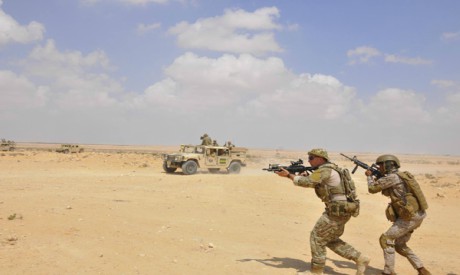
The activities of the "Bright Star 2018" exercise, which is carried out at Mohammed Najib Military Base and the combat training areas of Naval, Air forces and Northern Military Forces (PhotoL Egypt's ministry of Defense official website)
Egyptian-US military relations have grown steadily closer over the last four decades and Cairo is keen to further strengthen ties, especially in the area of joint defence.
The relationship has had a major impact on security developments in the Middle East in terms of counter-terrorist operations, intelligence coordination and maritime security in the Red Sea.
Egypt may have reduced its dependency on US armaments — according to the SIPRI 2018 Yearbook France now ranks as the country’s main source of weapons, followed by Russia and with the US third — arms imports from the US are far from being the sole determinant of the bilateral relationship.
The fact is the Egyptian-US armaments programme no longer meets Egypt’s needs following regional upheavals and the collapse of neighbouring Arab states.
Washington’s suspension of Apache helicopter and spare parts contracts during the period immediately following the 30 June 2013 Revolution made it clear that Egypt must have alternative options and Cairo is keen to remain apart from the jockeying for position among international powers.
“The Egyptian-US military relationship is Egypt’s most significant bilateral military relationship. It has been four decades in the making and is still doing well,” Mohamed Kamal, a professor of international relations and an expert on Egyptian-US affairs, told Al-Ahram Weekly.
The uninterrupted length of the military relationship is combined with training programmes, both practical and academic. Many Egyptian military personnel have followed training programmes in the US and there is a long history of joint military drills, most notably the Bright Star series, as well as collaboration in joint military operations such as the war to liberate Kuwait.
US military aid to Egypt was one of the outcomes of the Camp David peace process.
“US aid is extremely important in the context of our relationship with the US,” says General Mohamed Qashqoush, a professor of national security affairs and commander of the first rounds of the Bright Star manoeuvres. “Egypt is the second largest recipient of US military aid. The degree of benefit derived from the programme has been enormous. The US remains at the forefront in arms manufacturers. Its weapons are among the most technologically advanced in the world.”
“US weapons achieve their desired ends effectively. I was there when Egypt obtained the TBS-59 system, a tactical radar system that was the best in the world at the time. Egypt was the only country the US allowed to acquire the system which was otherwise deployed exclusively in US bases in Europe and in Bahrain.”
On Egypt’s diversification of armaments sources, Qashqoush told the Weekly: “The question as to what we would do in the event of tensions in our relationship with the US used to surface regularly and until about five years ago the answer, with regard to possible alternative arms supplies, was unclear.”
Kamal believes that US military aid, despite its importance in the bilateral Egyptian-US relationship, will inevitably change “sooner or later”, though this will be managed in such a way it does not affect overall ties.
Logistical support, says Kamal, is another critical dimension of the relationship.
“Despite the changing US role in the Middle East and the shift of focus from the Atlantic to the Pacific Egyptian logistical support is still needed. The Suez Canal continues to play a vital role, not just as a corridor for trade and energy supplies but as a major logistical asset.”
“The mutual strategic interests of both sides lend impetus to the strengthening of Egyptian-US relations,” says Qashqoush, “and through the course of four decades the mechanisms have evolved to ensure this takes place.”
*A version of this article appears in print in the 4 April, 2019 edition of Al-Ahram Weekly under the headline: In pursuit of security
Short link: